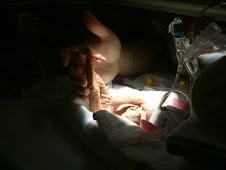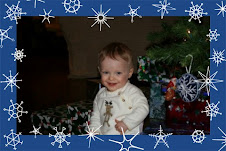At home, we have instituted a practice where most of the time, we only respond to Truman or do things for him when he speaks or signs. We have accepted that if Truman learns to speak as his primary form of communication, it will be a very long time from now and that communication in whatever form is more important right now. We don't differentiate whether his request or response is verbal or signed, as long as there's an attempt at communication.
His therapist, however, seems to be hung up on him speaking only and doesn't seem to be very responsive to his signs except for the few basic baby signs, like "more" that are typically known. I realize that she is a speech therapist, but I think that part of the problem is that although sign language is part of the "total communication" protocol called for in treating childhood speech disorders along with repetitive spoken words and picture cards, most SLPs can't sign beyond a few well-known "baby signs." Research also shows that teaching signing to augment missing verbal communication improves spoken communication as well.
I tried to talk with her about apraxia today and our research. She said Truman had not been verbal enough for her to conclusively diagnose apraxia. Bingo -- that's one of the problems. Anyway, she agreed that he exhibits most of the signs, as if it was the first time she considered it. I know the topic has been discussed before. It really bugs me to feel like I'm better educated about speech disorders than she is. She did remind us that a child should have 200-300 words by his second birthday and that we're six months beyond that. Yeah, thanks for that reminder.
I just feel like hanging up on getting him to speak words rather than increasing communication overall is holding him back in therapy. We did push to get his speech therapy upped to 3 times a week and will be working with multiple therapists. Hopefully, intensifying therapy will help things along. I also just finished up Truman's PECs cards this morning and sent them to be printed so that we can actively work on using that as well with our communication system.
Not long after I got back to the office, I got a call from a oral-motor specialist from the Callier Center for Communication Disorders at UT-Dallas. She was responding to an earlier e-mail inquiry from me to ask about some of their feeding programs.
We spent a half hour or so discussing Truman and his symptoms, treatments, and medical history. She was completely on the same page with me that severe feeding issues are the result of some underlying medical problem and that even behaviorial feeding issues in young children are caused by medical problems. Just from my description of Truman's difficulties with eating, drinking, and speech and how they manifest, she believes he has an oral-motor deficiency of some kind. Oddly, although I have been saying for months now that I believe there is an 0ral-motor problem that is at the root of both the speech and feeding issues, she is first medical professional who seemed to understand what I am talking about and have a background in such things. We're going to do an evaluation with her and discuss getting Truman into Callier Center's program for oral-motor feeding issues which focuses on manipulation and training of the oral-facial muscles and has no behaviorial feeding training element. It's a private pay program, but the cost is not prohibitive. Coincidentally, she is also their expert on apraxia, which makes sense because it's an oral-motor speech disorder.
On another note, we ordered Truman a children's two-octave piano yesterday because he really seems to be interested in music and has a surprising ability to keep time for a two-year-old. Sounds like the apple doesn't fall far from the tree (his dad's tree, that is). That, and music is often beneficial as an outlet for expression for individuals who can't communicate easily. The piano has colored keys and songbooks based on the colors for Ben and Truman to practice with. Depending on how he responds, we may consider music lessons before too long.
By the way, Truman is just picking up signs left and right. Some of the new ones include:
- cracker
- socks
- stars
- wash hands
- Signing Times
- hungry
- thirsty
- hat
- hair
- various body parts
- apple
- banana
- moon
- book
- want
- mouse
- bear
- I Love You
- harmonica
- sorry
- bird
- ball
- car
- telephone
- train
- tree
He has also added a variation of "uh oh" to his spoken words and has learned to mimic sounds for a monkey, dog, car, cat, and a cow.


No comments:
Post a Comment